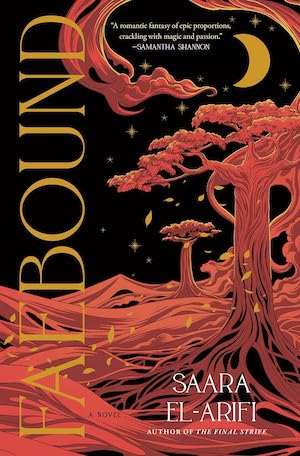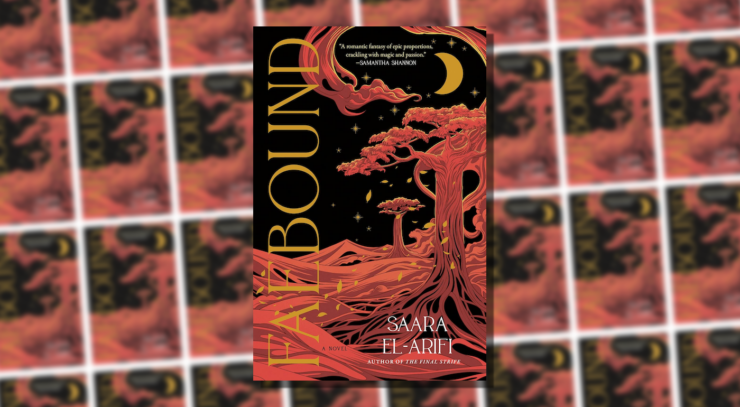Faebound begins a new series from Saara El-Arifi: a fantasy set in a world of perpetually warring elves, where an exiled soldier stumbles across the hidden race of fae, who are cursed to remain in their underground kingdom on account of their eradication of an entire species.
Yeeran is the youngest colonel in the history of her tribe, the Waning elves. They fight with the other elven tribes over a precious resource, the mineral known as fraedia. The wars have been going on for longer than anyone can recall, and it has driven their society to the point where starving children are enlisted younger than ten years of age. From the text, the fighting seems confined to the region where the resource is located, and the regions that the elves inhabit do not seem to be particularly vast. Yeeran’s lover is the elected ruler of their tribe; Yeeran’s sister, Lettle, is a diviner, following the old magic of foretelling that few among the elves still respect. When Yeeran makes a fatal error on her first day in her new command, exceeding her orders and getting several hundred troops under her command killed, her chieftain lover orders her exiled in lieu of her execution.
To Yeeran, exile is a fate worse than death. When, soon after she’s left in the wilderness beyond the bounds of elven civilisation, she sees one of the magical beasts—the obeah—whose hide and bones are necessary to make the tools that allow elves to deploy offensive magic, she thinks that maybe she can earn a reprieve by killing it and bringing its skin home. For obeah are rare and growing rarer, and Yeeran still believes her lover wants what Yeeran wants: an end to the war, and for their tribe to live in peace and prosperity.
Unbeknownst to Yeeran, Lettle has followed her to the wilderness, accompanied by Rayan, one of Yeeran’s loyal under-officers. They meet up with her in time to witness her kill the obeah—and in time to be captured by a party of fae, secretly scouting in the world outside their prisoning homeland.
The obeah are companion animals to the fae. A bond with an obeah is what allows a fae to use their innate magic, but the fae’s life is linked to that of the obeah, and vice versa: To kill one is to kill the other. Yeeran has just killed the obeah that was bound to a prince of the fae, and their fae captors mean to bring her back to their home to execute her—and to keep her companions in perpetual imprisonment. The leader of their captors is the fae Furi, sister to the dead prince. She’s viciously angry at Yeeran. Yeeran finds her attractive.
Buy the Book


Faebound
Yeeran’s execution is forestalled when an obeah chooses to bond with her. This is unprecedented in fae history. Instead, she’s sentenced to a term of service in the fae military—if she can survive an initiation designed to demonstrate her mastery of fae magic. The people training her for that initiation include Furi, who still hates her, and Prince Nerad, the only other surviving heir to the fae throne. Meanwhile, Lettle is falling in love with Rayan (and is convinced that a prophecy means she’ll cause his death if she lets herself love him) while trying to gather information on fae society and the constraints of the fae’s imprisoning curse in order to escape. Only members of the royal family can prise open the barrier holding the fae in their underground kingdom, but if the royal family leaves, the kingdom will decay. Power, politics, and fraught personal relationships collide with the assassination of the fae queens and the revelation that Rayan is the secret child of the dead fae prince, and so eligible for kingship according to the magic that chooses fae rulers.
There is much of interest in Faebound: the glimpses we get of elven society, with their perpetual war and elected leaders; fae society and the magics that bind the fae to their underground kingdom; Yeeran and Lettle’s dysfunctional but loyal family relationship; Yeeran’s taste in women and unshakeable (yet unearned) loyalty to her chieftain; the mystery of what the fae are in fact doing in the world above.
And yet I do not see how Faebound ties the thread of its events together into a unified narrative. It is the first book in a series, but I have no sense for its narrative arc, or the potential direction of its sequel. Part of this is that our two viewpoint characters, Lettle and Yeeran, do not make many intentional decisions that much effect the events of the narrative: They’re central to events, in that several important things happen while they’re present, but they’re not moving most of these developments, and certainly not on purpose. Staggering around trying to figure out how things work is intensely relatable, I grant you, but not particularly satisfying.
All the more so as more than one piece of significant information is hidden from both viewpoint characters and the reader until Faebound’s conclusion, and at least one of those pieces of information—that Rayan, too, has become bound to an obeah—is hidden by someone who is supposed to be their friend and ally for very slight reasons. (Although the characters are in their twenties and thirties, they frequently act like young, insecure teenagers, and fail to talk to each other about things of emotional import in favour of storing up grievances to blow up angrily at inopportune moments, or of ignoring each other’s reasonable concerns until a furious argument is the inevitable result, or of moping resentfully because they assume that someone they’ve turned down for a sexual relationship might—they’re just assuming, rather than talking about it—be having a sexual relationship with someone else.) And some connections are simply never drawn: Yeeran’s relationship with Furi combines antagonism with sexual tension and eventually leads to respect and also orgasms, but never leads Yeeran to re-examine her previous relationship with her old chieftain, or consider whether there are any problems associated with getting sexually involved with someone who holds a position of power relative to you—even though Furi occupies a similar position of authority, including over Yeeran, as her previous lover.
I wanted to enjoy Faebound. And at points, I did: The prose is straightforward—stylistically, Samantha Shannon is a good comparison—the character relationships engaging, the setup interesting and full of potential. But Faebound’s characters seem to me more observers of the narrative than drivers of it, and they make too few connections in what they’re observing (and see too few thematic complexities) for me to feel satisfied with the experience.
Should I soften this conclusion? Should I tell you that reading is a matter of taste, and that where one person sees a lack, another finds a perfect balance? But you know this already. I think Faebound is probably perfectly pitched to appeal to people who prefer their epic fantasy to be less dense and much more straightforward than I do, but just as unapologetically queer.
Faebound is published by Del Rey.










